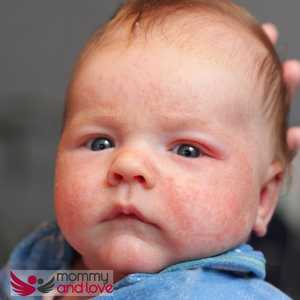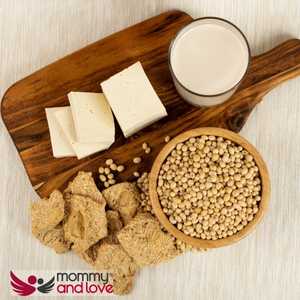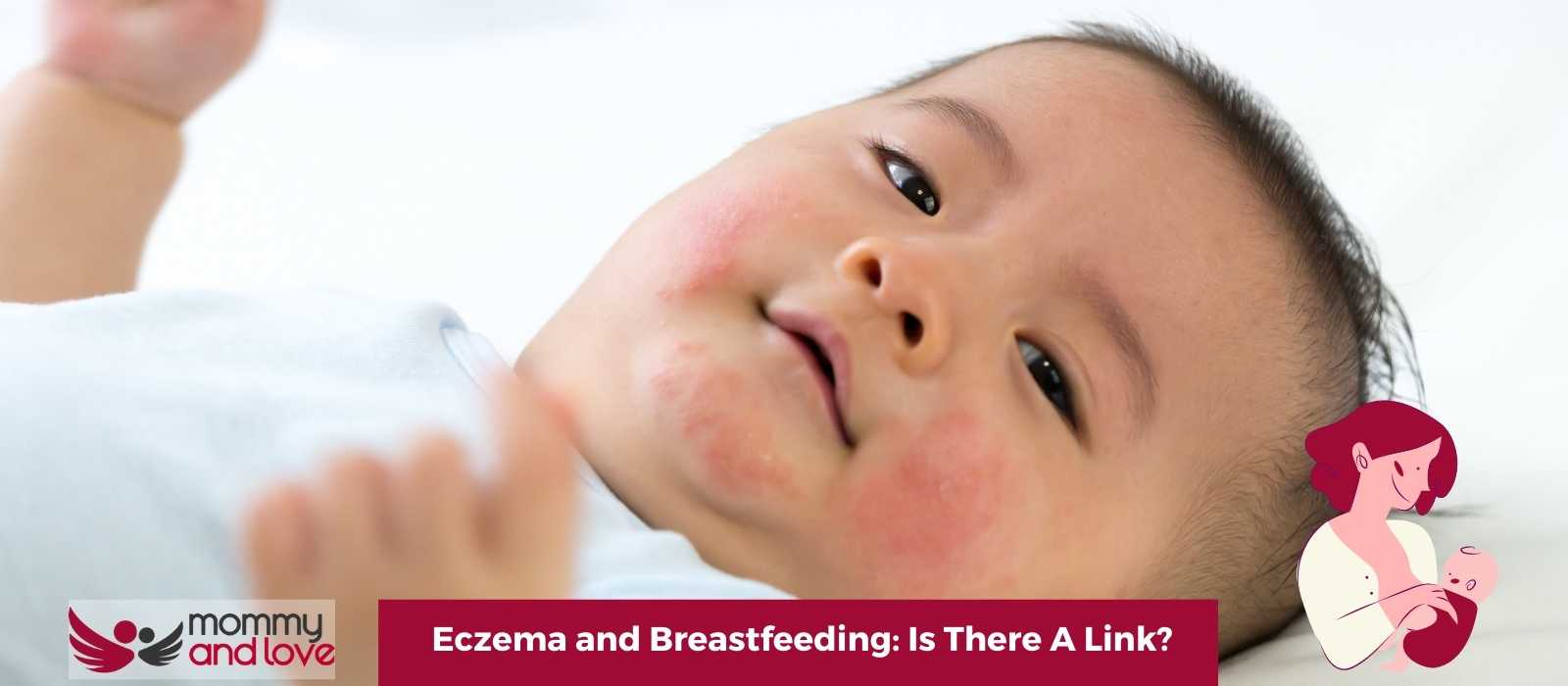Is there really a link between baby eczema and breastfeeding? There’s nothing worse than seeing your baby or toddler break out in an itchy rash, and moms very often obsess over the cause of their baby’s eczema.
In this blog post, we will look at what eczema is, what causes it and what you can do to help breastfed babies with eczema.
What is Eczema?

Eczema literally means “to boil” and describes a skin condition that causes inflammation, dry skin and an itchy rash. Eczema affects around 10% of the population, including babies and children.
Atopic disease or atopic dermatitis is the most common form of eczema amongst small children. This type is also associated with allergies, leaving many moms wondering if there might be a link between breastfeeding and eczema.
What Foods Trigger Eczema?
Common food allergies would be; soy, wheat, eggs, cow’s milk tree nuts and peanut allergy. It is particularly worth considering food allergy if your little one is at high risk due to a family history of allergies to certain foods or food intolerance.
If you are worried that your baby’s eczema may be caused by a food allergy, your best bet is to take him to a doctor who specializes in allergic conditions.
They will be able to assess your baby’s symptoms, evaluate the risk factors for atopic dermatitis and carry out allergy testing. A diagnosis will help you prevent eczema rash.
If your child is on to solid foods, they might be reacting to something in their own diet, however, your breastfed baby may also be reacting to something in the breastfeeding mom’s diet.
An elimination diet can help you work out what food is causing your baby to develop eczema. Be sure to check out our post on Foods To Avoid While Breastfeeding
How Do I Confirm If My Baby Has Food Allergies?
Blood tests can be distressing for a young child. If your baby is exclusively breastfed and you suspect food allergies, the easiest thing may be to try eliminating potential triggers from the maternal diet.
Do your own research, consider your diet and what foods may have caused your baby’s eczema. Take a look at your family history to see if there are particular foods your baby may have a higher risk of developing.
One of the most effective methods for evaluating whether your breastfed baby has a food allergy or sensitivity is to trial the “elimination diet”.
This will help you to identify which food groups your infant is sensitive to. To get this done moms should remove one meal group and see how the baby reacts to that.
Sometimes it takes one month to see if there is any improvement in your child’s health or atopic disease.
What Else Can Trigger Atopic Dermatitis?
Just like asthma, atopic dermatitis is caused by an overreaction of the immune system, causing inflammation.
Some studies have suggested a link between early weaning onto solid foods and allergic reactions, and the American Academy of Pediatrics recommend exclusive breastfeeding for the first 4 months of life to give a protective effect.
The triggers for atopic dermatitis are similar to those for asthma and hayfever; The Journal of Clinical immunology identify potential triggers such as food allergy such as soy, wheat or peanut allergy, pollen, pet dander, household cleaners and stress.
How Do I Find What Foods Are Causing Issues For My Baby?

If you want to determine which causes the problems then an elimination diet can be helpful. Be sure to look one at a time at the common triggers: wheat, eggs, soy, cow’s milk, peanuts and tree nuts.
The Canadian family physician website lists whole cow’s milk as one of the more common allergens amongst young children.
Can a breastfeeding mom’s diet affect her baby’s eczema? An elimination diet will help you establish if something in your diet is affecting your breastfed baby and causing eczema.
Eliminate one food trigger at a time, if you see no improvement within a few weeks, move to the next possible allergen.
Can A Breastfeeding Mom’s Diet Affect Eczema
If you are breastfeeding a baby who has allergies, your breast milk might cause your child to develop eczema- especially if the baby is exclusively breastfed. This doesn’t however mean that you have to stop breastfeeding- Speak to your lactation consultant for support.
It is entirely possible for food proteins from the maternal diet to cause symptoms in the exclusive breastfeeding baby. If your baby’s eczema is caused by allergies, an elimination diet might help prevent eczema.
It is worth cutting out, one food at a time, common allergen foods such as eggs, wheat, cow’s milk, and tree nuts. If your baby is taking solid foods, you would place the same dietary restrictions on them.
Do Food Allergies Trigger Eczema in Breastfed Babies?
Eczema is one of the most common symptoms of food allergies. You might notice your child’s skin break out in an itchy rash after you introduce, for example, eggs or tree nuts to their diet.
Always speak to your doctor if family history makes your child at high risk for allergic reactions.
Early introduction to solid foods is thought by many paediatricians to increase a child’s risk of developing eczema.
The trigger can be harder to pin down in breastfed babies because anything mom is eating may be carried through to breast milk.
One of the biggest culprits is cow’s milk, and the breastfeeding mom often struggles to give this up!
Should I Avoid Breastfeeding?
Despite the problems mothers have with their children who suffer from eczema or have been diagnosed with constant eczema, the American Academy of Pediatrics recommends breast-feeding as an effective treatment option for children.
The atopic triade (asthma, eczema, allergies and rhinitis) consists of 3 common health conditions affecting children, which occur in conjunction.
The medically reviewed research findings are surprisingly positive and essentially the American Academy of Pediatrics state that breastfeeding can prevent your child from developing eczema as well as asthma.
If you’re questioning your decision to breastfeed, why not read more about the benefits of breastfeeding for babies?
Breast Milk or Formula?
The research suggests that breastfeeding your infant is a great way to support your child’s immune system and lower their risk of developing eczema.
Infant feeding practices vary across the world, but the research clearly shows that breast milk generally helps when it comes to a growing child’s immune system.
Exclusive breastfeeding reduces the risk of a number of childhood illnesses, as well as allergies and food intolerance. Breast Milk is easily digested, perfect for your baby’s developing system.
Formula Milk is generally made from cow’s milk, so if your child has issues with cow’s milk, swapping to formula milk is unlikely to help.
Remember that an overactive immune system is often the cause of baby eczema- while formula milk has an important place in our society, it simply cannot support your baby’s immune system the way your breast milk can.
You can even apply breast milk directly to your baby’s skin when they are having a flare of eczema; you’ll likely find that this soothes the skin and reduces itching.
What Is The Best Treatment for Eczema?

Atopic dermatitis can persist into adulthood, although many children find that their symptoms ease as they grow.
In the meantime, there are a few easy, natural ways parents can soothe eczema in babies and children.
The best thing you can do is reduce the risk of a flare- if you can identify a food allergy or other allergies, eliminate the cause.
Know the common culprits, such as soy, cow’s milk, wheat and eggs. Speak to your doctor if you need help with identifying certain foods in your or your child’s diet that may be causing the problem.
An elimination diet can be helpful-eliminate one food at a time and watch for improvement.
Before you try a medicine treatment, why not try some natural solutions such as topically applied coconut oil or breast milk? These can both be safely applied to an infant’s skin, and for many children, this is enough to bring relief.
Breastfed babies have a reduced risk of developing eczema, with exclusive breastfeeding supporting the infant’s immune system.
In cases of severe eczema, you may need to discuss an emollient cream or medicine, such as corticosteriods, with your doctor. This option would depend on the age of your child and the severity of the allergy.
Can Breast Milk Cause Eczema? Here’s The Bottom Line
While it is possible that breastfed babies might be exposed to allergens through mom’s breastmilk, this isn’t quite a case of breast milk causing eczema!
The American Academy of Pediatrics state that breastfeeding remains one of the best ways to boost your infant’s immune system, in turn reducing their risk of developing eczema.
Breastfeeding has many benefits for babies so you should speak to your doctor if you are concerned that your child may have a food allergy.
Should your child receive an allergy diagnosis, you can safely eliminate the food or foods causing an issue and continue to give your milk to your little one.

This article was written by Sandra Baker – full time writer and the mother of four amazing kids (including twins!)
She’s also a breastfeeding counselor and has spent years helping new parents learn how to care for their children. When she’s not writing or caring for her children, Sandra likes to spend time reading and taking walks with her husband.




